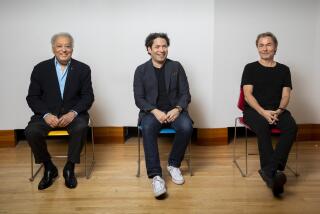MUSIC REVIEW
- Share via
The highly accomplished polyglot string ensemble iPalpiti wrapped its annual Festival of International Laureates at Walt Disney Concert Hall on Saturday night, about a month later than usual. Aside from the late date, all else was in place for those who miss hearing classical music in downtown L.A. during the long summer months when the Hollywood Bowl expropriates the field.
The two big works on the program have become iPalpiti staples in past summers -- the Concerto for Piano and Violin by Mendelssohn, who wrote it when he was 14, and Mahler’s tasteful, tasty inflation of Beethoven’s String Quartet No. 11 for string ensemble. But if my notes are accurate, the performances of the present iPalpiti represent huge strides beyond those of previous editions in these pieces.
Conductor Eduard Schmieder coaxed an absolutely precise, silken sound from his young players in the Mendelssohn, getting them to observe all kinds of careful dynamic terracings. Tim Fain, a Santa Monica-born violinist who received his advanced training on the East Coast, proved to be a real comer, displaying a gorgeously sweet tone, thrusting but never over-the-top attacks and a youthful, even hip, physical presence. The Mendelssohn gave Fain plenty of room to engage in good-natured virtuoso jousting with Italian pianist Mariangela Vacatello, whose virtues were masked somewhat by the watery tone of a lidless Steinway.
As difficult as it is for a string quartet to stay together in the Beethoven, Mahler made it doubly tough for a string ensemble. Yet iPalpiti could pull it off flawlessly with style and lovely articulation at speeds that conceded nothing, particularly in the dizzying, fast coda.
The lead-in pieces for the main courses were thoughtfully chosen. You might have recognized the neo-baroque strains of the Allegretto movement of Karl Jenkins’ “Palladio” from a TV commercial for diamonds (the piece is a gem in a horde of costume-jewelry treacle that seems to be Jenkins’ usual stock-in-trade). Schmieder and company found new possibilities for dynamic shaping in this piece, which dovetailed nicely into the opening of the Mendelssohn.
Beethoven/Mahler, meanwhile, served as a serioso yet uplifting antidote to Latvian composer Peteris Vasks’ appropriately named “Musica Dolorosa,” a downer of a threnody in which Schmieder and iPalpiti piled up the dissonances in the piece’s center to lacerating and thrilling effect. The encores brightened the mood further -- a sometimes nutty arrangement of Mozart’s “Turkish” March and another of Bohm’s fizzing “Moto Perpetuo.”
--
More to Read
The biggest entertainment stories
Get our big stories about Hollywood, film, television, music, arts, culture and more right in your inbox as soon as they publish.
You may occasionally receive promotional content from the Los Angeles Times.










